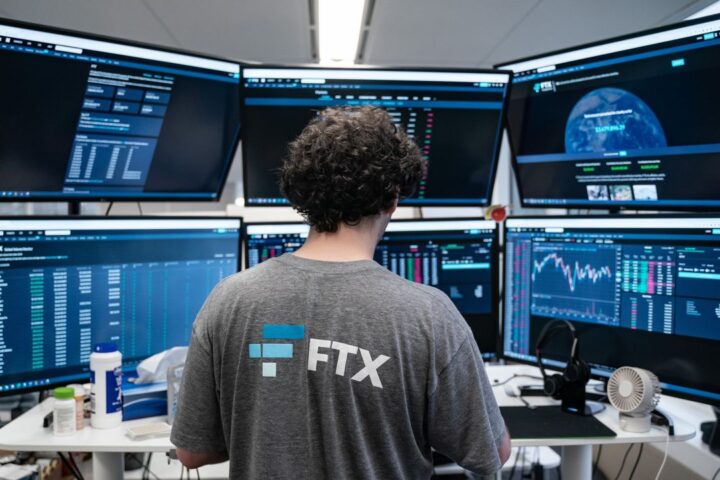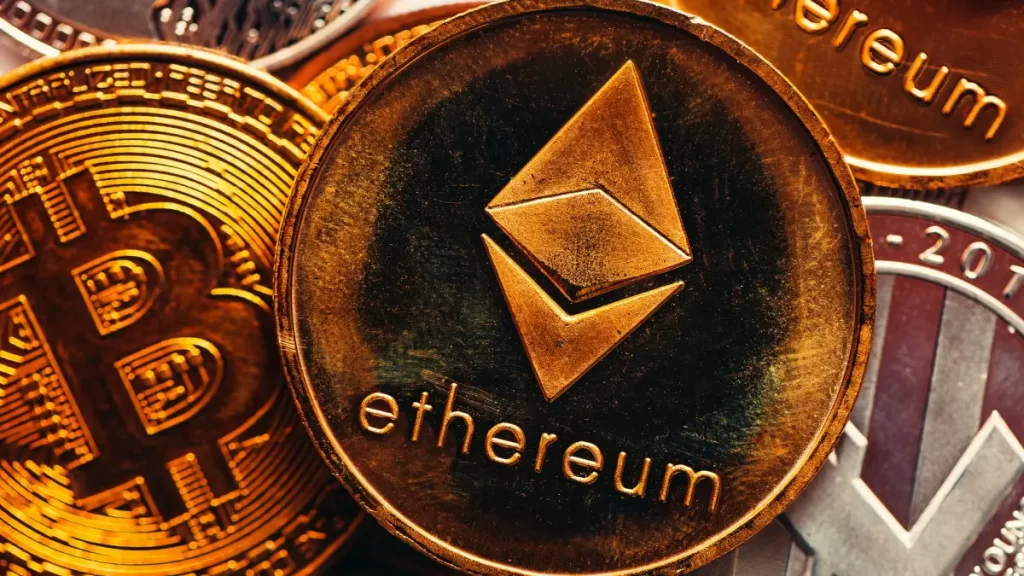BlackRock has officially confirmed its plans to launch a spot Ether exchange-traded fund (ETF) by submitting a 19b-4 form to the United States Securities and Exchange Commission (SEC) on November 9.
The filing, made on behalf of the $9-trillion asset management firm by Nasdaq, proposes an ETF named the “iShares Ethereum Trust.” This move signifies BlackRock’s strategic expansion beyond Bitcoin in pursuit of its ETF objectives.
Prior to the formal filing, BlackRock had registered the corporate entity “iShares Ethereum Trust” in Delaware, providing the initial indication that a spot Ether ETF filing was on the horizon.
This development aligns with the growing interest among financial institutions, including BlackRock, in cryptocurrency-backed ETFs in recent months.
According to Bloomberg ETF analyst James Seyffart, there are currently several firms vying for SEC approval to launch a spot Ether ETF.
These contenders include VanEck, ARK 21Shares, Invesco, Grayscale, and Hashdex, all eager to tap into the growing demand for cryptocurrency investment products.
READ MORE: SEBA Bank Receives License from Hong Kong Regulator to Offer Crypto Services in Asia Pacific
In response to the news of BlackRock’s progress with the iShares Ethereum Trust, the price of Ether (ETH) experienced a significant surge, rising by 8.9% to reach $2,080.
Over the past 24 hours, ETH has gained 10.1%, as reported by CoinGecko.
This price rally has allowed Ether to regain some market dominance against Bitcoin (BTC), which had been outperforming ETH in recent months.
As a result of this positive development, ETH’s market dominance has increased to 17%, marking a 1.3% percentage point gain compared to its previous position.
The cryptocurrency market continues to witness increased interest from institutional investors and asset management firms, with BlackRock’s move into the spot Ether ETF space being a notable indication of the evolving landscape of cryptocurrency investment opportunities.
HSBC, one of the world’s leading global banking companies, has unveiled its ambitious plan to introduce an institutional custody platform designed for tokenized securities, often referred to as security tokens.
In collaboration with Metaco, a technology firm owned by Ripple, HSBC is set to integrate its institutional platform, Harmonize, with a groundbreaking custody service tailored for digital assets.
This strategic partnership was officially announced on November 8, signaling HSBC’s firm commitment to the burgeoning world of digital finance.
The anticipated launch date for this innovative digital asset custody service is slated for 2024, marking a significant milestone for the banking giant.
It will complement HSBC’s pre-existing digital asset issuance platform, known as HSBC Orion, and its offering for tokenized physical gold, which made its debut on November 1, 2023. Collectively, these services will constitute a comprehensive digital asset solution for HSBC’s institutional clients, further solidifying the bank’s position in the evolving digital asset markets.
READ MORE; US Lawmaker Proposes Cutting SEC Chair’s Salary to $1
John O’Neill, HSBC’s Global Head of Digital Assets Strategy, emphasized the significance of these new offerings, stating that they underscore HSBC’s dedication to advancing digital asset markets.
The decision to venture into digital asset custody was prompted by the escalating demand from asset managers and asset owners for secure custody and fund administration services for their digital assets. Zhu Kuang Lee, HSBC’s Head of Digital, Data, and Innovation, highlighted the evolving nature of this market, stressing that asset servicers have never faced a more critical moment to innovate.
Notably, HSBC clarified that its forthcoming digital asset custody platform for institutional investors will exclusively cover security tokens and will not encompass cryptocurrencies like Bitcoin or stablecoins such as Tether.
In contrast to pure cryptocurrencies, tokenized securities represent digital versions of securities issued and transacted on blockchain networks.
HSBC’s foray into the realm of tokenized securities aligns with its broader engagement with blockchain and the cryptocurrency industry. On November 1, the bank announced the successful testing of tokenized deposits in collaboration with Ant Group, a major Chinese financial services provider.
This move demonstrates HSBC’s commitment to staying at the forefront of financial innovation and technology within the global banking landscape.
A staggering sum of nearly $600,000 in Bitcoin has been swindled from unsuspecting users who fell prey to a fraudulent Ledger Live application masquerading on Microsoft’s app store.
The revelation comes from the vigilant cryptocurrency investigator, ZachXBT.
On November 5th, ZachXBT unearthed the ruse named “Ledger Live Web3,” designed to deceive users into believing they were downloading the legitimate “Ledger Live” interface, primarily used for managing Ledger hardware wallets, where cryptocurrencies are securely stored offline.
The scam artist has managed to amass approximately 16.8 BTC, equivalent to $588,000, via 38 transactions using the wallet address “bc1q….y64q,” as reported by Blockchain.com.
Two transactions have seen about $115,200 exit the fraudster’s wallet, leaving a balance of $473,800 or 13.5 BTC.
In a subsequent update, ZachXBT hinted that Microsoft might have taken action by removing the counterfeit Ledger Live app from its platform.
The illicit activities involving this wallet began on October 24th, with an initial transfer of $5,210 to the scammer’s address. Before that, the wallet remained dormant.
READ MORE: SEC Seeks Summary Judgment Amidst Controversy Over Terraform Labs’ Alleged Violations
Notably, most of the transactions transpired after November 2nd, with the largest sum of $81,200 vanishing from victims’ wallets on November 4th.
A scrutiny by Cointelegraph unveiled that the deceptive “Ledger Live Web3” application had infiltrated Microsoft’s app store as early as October 19th.
The severity of this situation prompted victims to reach out to ZachXBT, with one victim even suggesting that Microsoft should bear responsibility for allowing the fraudulent Ledger Live app onto their platform.
This incident isn’t the first instance where a counterfeit Ledger Live app has infiltrated Microsoft’s app store.
In the past, Ledger’s support account on social media, X (formerly Twitter), had alerted users to similar scams, occurring twice in December and March.
Although Ledger has not issued a statement regarding this particular scam, they have consistently urged users to obtain Ledger Live exclusively from their official website, ledger.com.
Cointelegraph attempted to contact Microsoft for a response but has yet to receive a reply, raising concerns about the security and oversight of applications within their app store.
Lawyers representing the individual responsible for the $116 million Mango Markets exploitation have successfully obtained a delay in his fraud trial, pushing the start date to April 8, 2023.
Originally scheduled for December 4, Avraham Eisenberg’s fraud trial faced delays due to various factors, as explained by his legal team.
They presented a motion for a continuance to district court Judge Arun Subramanian on November 2, which was granted.
In a court filing on November 3, Judge Subramanian confirmed the trial’s rescheduled commencement date.
Despite opposition from United States prosecutors, who contested the motion for continuance, the judge ruled in favor of the defense.
Subramanian additionally instructed both the U.S. prosecutors and Eisenberg’s legal team to submit an updated schedule for pretrial motions and submissions by November 7.
Eisenberg, who admitted involvement in the Mango Markets exploit, pleaded not guilty to three criminal counts related to commodities fraud, commodity manipulation, and wire fraud in June.
Eisenberg’s lawyers cited the need for more time to review extensive discovery materials provided by U.S. prosecutors as a primary reason for the delay.
READ MORE: SEC Seeks Summary Judgment Amidst Controversy Over Terraform Labs’ Alleged Violations
They mentioned that the government had been continuously sharing voluminous discovery materials, requiring ongoing analysis and discussions with their client.
Complicating matters further, Eisenberg’s sudden transfer to the Metropolitan Detention Center (MDC) in Brooklyn on October 26 disrupted their preparations.
Due to the move, Eisenberg was unable to take the annotated discovery materials and other relevant legal documents with him.
The attorneys expressed concerns about the hindrance to their access to Eisenberg caused by his relocation to the MDC.
This prison is notable for being where former FTX CEO Sam Bankman-Fried returned after being convicted on seven fraud-related charges on November 2.
In addition to his upcoming fraud trial, Eisenberg faces charges filed by the Securities and Exchange Commission on January 20, accusing him of manipulating the Mango Markets governance token, MNGO.
The allegations involve Eisenberg taking out substantial loans against inflated collateral, depleting Mango’s treasury of approximately $116 million. His arrest in Puerto Rico on December 27 preceded these charges.
Eisenberg publicly confessed to the exploit on October 15, 2022, asserting that his actions were legally sound.
Initially, he returned $67 million to Mango Markets’ decentralized autonomous organization as part of a bounty deal. However, the Mango Markets team subsequently filed a lawsuit against Eisenberg, seeking $47 million in damages, plus interest.
Coinbase, the cryptocurrency exchange, demonstrated a significant improvement in its financial performance during the third quarter, reporting a narrowed net loss of $2 million compared to a substantial $545-million loss in the same period the previous year.
The company’s Q3 results, released on November 2, 2023, revealed a 14.2% year-on-year increase in total revenue, reaching $674.1 million, surpassing the London Stock Exchange Group’s estimate of $653.2 million.
However, there was a 4.8% decrease in revenue on a quarter-on-quarter basis.
Of the total revenue, $334.4 million was generated from subscriptions and services, primarily driven by stablecoin and blockchain rewards, while transaction-based revenues accounted for $288.6 million.
Despite the positive financial results, Coinbase experienced a notable decline in trading volumes.
Consumer trading volume decreased from $26 billion in Q3 2022 to $11 billion, while institutional trading volumes dropped from $78 million in Q2 to $65 billion and $133 million in Q3 2022.
Despite the challenging trading environment, Coinbase expressed satisfaction with its Q3 performance, stating, “Q3 was a strong quarter for Coinbase.
READ MORE: 3 Best Crypto & Blockchain PR Agencies
Amid multi-year low levels of volatility, we are pleased with our financial results.”
The exchange also reported positive adjusted EBITDA for the third consecutive quarter, indicating progress toward building a sustainable business model for long-term growth.
Adjusted EBITDA, which stands for “earnings before interest, taxes, depreciation, and amortization,” is a crucial metric for industry analysts to make meaningful comparisons among companies.
Following the release of its Q3 results, Coinbase’s share price (COIN) experienced a surge of 8.7% during trading hours, reaching $84.6.
However, it later dipped by 3.7% to $81.5 in after-hours trading, according to Google Finance.
In conclusion, Coinbase demonstrated resilience and improvement in its financial performance during the third quarter of 2023, narrowing its net loss, exceeding revenue expectations, and maintaining positive adjusted EBITDA, despite challenges posed by lower trading volumes and market conditions.
The company’s focus on sustainability and long-term growth remains a key driver for its future success.
The Depository Trust and Clearing Corporation (DTCC) has added the ticker symbol for Invesco and Galaxy’s spot Bitcoin exchange-traded fund (ETF), known as BTCO, to its website, signaling a significant step forward in the application process for these two asset management firms.
This development has taken place within the last six days, as the web archiver Wayback Machine did not display any listing for the BTCO ticker on October 25.
It’s important to note that having a ticker added to the list of “ETF Products” on the DTCC’s website does not guarantee the future approval of the product.
A DTCC spokesperson emphasized that this is a standard practice aimed at preparing for the launch of a new ETF in the market.
READ MORE: Gary Gensler’s Critique of SEC’s Inconsistent Bitcoin ETF Approach Resurfaces
The spokesperson clarified that being listed is not indicative of the outcome of any pending regulatory or approval processes.
The joint spot Bitcoin ETF managed by Invesco, a global investment firm, and Galaxy Digital, a crypto asset fund, had its application reactivated on June 21.
This decision to resubmit the application to the Securities and Exchange Commission (SEC) occurred in response to a surge in similar filings for spot Bitcoin ETF products.
The wave of applications was initiated by BlackRock, a prominent investment giant, which submitted its groundbreaking application for a spot Bitcoin ETF on June 15.
The addition of BTCO to the DTCC’s list indicates the progress made by Invesco and Galaxy Digital in navigating the regulatory landscape for their Bitcoin ETF.
However, it’s essential to understand that regulatory approval remains a separate and crucial step in the process.
The ETF industry is closely watching these developments, as the potential approval of Bitcoin ETFs could open up new opportunities for investors and further legitimize cryptocurrencies as an asset class.
El Salvador, under the guidance of investment management firm VanEck’s strategy adviser, Gabor Gurbacs, is poised to emulate Singapore’s remarkable transformation into a financial hub within the Americas.
Gurbacs recently expressed this sentiment on October 28th through a post on X (formerly Twitter).
He highlighted the potential for El Salvador to become a regional economic powerhouse, much like Singapore achieved in the late 1990s.
Gurbacs identified two key catalysts for this transformation: capital investment and immigration.
Just as Singapore attracted substantial capital inflows and a skilled workforce, he expects these factors to drive El Salvador’s economic growth in the coming years.
These observations were sparked by a tweet from Max Keiser, a well-known American broadcaster and Bitcoin advocate who now resides in El Salvador.
Keiser lauded the country as “The New Land of the Free,” citing several compelling reasons.
Notably, El Salvador has embraced Bitcoin, making it legal tender in September 2021 and introducing the Chivo Wallet, a Bitcoin custodial wallet, for all Salvadorans.
This move has garnered significant attention and interest from global investors.
Under President Nayib Bukele’s leadership since June 2019, El Salvador has emerged as a promising emerging economy.
READ MORE: Binance CEO CZ’s Net Worth Plummets by $11.9 Billion Amid Declining Trading Volumes
Its sovereign bonds have outperformed those of many other emerging markets, delivering an impressive 70% return by August.
Major financial institutions like JPMorgan have taken notice of El Salvador’s economic potential.
In addition to its cryptocurrency initiatives, El Salvador is harnessing its volcanic resources to power a Bitcoin mining operation through Volcano Energy, which secured a substantial $1 billion investment and was launched in June.
Keiser serves as the company’s executive chairman, and a partnership with Bitcoin miners Luxor Technology led to the recent launch of its first mining pool.
Furthermore, El Salvador has enlisted Saifedean Ammous, the author of “The Bitcoin Standard,” as an economic advisor to the National Bitcoin Office.
The country’s strategy includes accumulating Bitcoin to reduce its debt over the next five years.
Additionally, Bukele’s decision to eliminate taxes on technology innovations in April is expected to attract more entrepreneurs and foreign capital, further bolstering the nation’s prospects for economic growth.
In summary, El Salvador is on a trajectory to become a financial and economic powerhouse in the Americas, drawing inspiration from Singapore’s success story.
With its progressive stance on cryptocurrencies, favorable investment climate, and innovative policies, the country is poised to thrive in the coming years.
Monday’s dramatic surge in the price of Bitcoin has propelled Bitcoin-related stocks to unprecedented heights. Notable names like Coinbase and MicroStrategy have hit fresh multiweek highs, reflecting the growing enthusiasm around cryptocurrencies.
The surge in Bitcoin’s price has translated into significant gains for Bitcoin mining stocks. Riot Blockchain, a U.S.-listed company, saw its stock soar by 11.69%, while Marathon Digital Holdings witnessed a substantial 14.6% increase.
This impressive performance can partially be attributed to the upcoming Bitcoin halving event, which will reduce the mining reward from 6.25 BTC to 3.125 BTC per block, thereby increasing scarcity and potentially driving up demand.
In addition to outperforming Bitcoin in the recent price rally, Bitcoin mining stocks have also displayed remarkable year-to-date (YTD) gains.
For instance, Cipher Mining has seen an astounding YTD increase of 356%, far surpassing Bitcoin’s YTD gains of 86%.
Similarly, Riot Platforms has recorded a remarkable 163.10% YTD increase, and Northern Data, a Frankfurt-based general processing unit miner, has surged by an impressive 291.40%.
Other companies such as Hut 8 Mining, Iris Energy, Bitfarms, Marathon Digital, and Hive Technologies have all posted growth rates exceeding 100% in 2023.
READ MORE:Ripple’s Legal Victory: Slim Odds for SEC’s Appeal in Ongoing Lawsuit
Apart from publicly traded Bitcoin mining companies, other Bitcoin-focused firms like Coinbase and MicroStrategy have also reached multiweek highs.
Coinbase’s stock showed a 3.42% increase at the time of writing, while MicroStrategy, a prominent holder of Bitcoin, registered a substantial 9% gain on the daily charts.
MicroStrategy’s investment in Bitcoin has experienced a roller-coaster ride in 2023.
Despite being in the red by as much as -50% during the bear market, the company has managed to bring its Bitcoin holdings back into profitability.
Currently holding 158,245 BTC, which were acquired for $4.68 billion at an average price of $29,582,
MicroStrategy’s investment is now valued at $5.5 billion, resulting in nearly $1 billion in unrealized gains.
On October 23, the price of Bitcoin surged past the $35,000 mark, reaching a one-year high, before retracing below $33,000.
Just a day later, on October 24, Bitcoin experienced another 5% surge, trading above $34,500 at the time of writing.
These price movements continue to captivate the attention of both investors and enthusiasts in the cryptocurrency space.
Other Stories:
Cryptocurrency Lawyer John Deaton Questions Lightning Network’s Security Amidst Growing Concerns
Uniswap Founder Burns 99% of HAY Token Supply, Shaking Crypto Markets
Fight Me: Triumphia Origins NFTs mint out in under 2 minutes ahead of the Fight Me game launch
Cryptocurrency advocate and lawyer John Deaton has voiced his criticism of the Lightning Network, asserting that it falls short in comparison to the “Spend The Bits” protocol operating on the XRP Ledger (XRPL).
The Lightning Network represents a layer-2 scaling solution for Bitcoin, intended to enhance the scalability and efficiency of Bitcoin transactions through the facilitation of off-chain peer-to-peer transactions.
In a recent tweet on October 21, Deaton disclosed that he is not only an angel investor in Spend the Bits but also serves as its chief legal officer.
His earlier endorsements of Spend The Bits as a viable alternative to Lightning on the Bitcoin blockchain underscored its growing reputation.
Deaton has previously lauded the protocol, describing it as a more secure means of utilizing Bitcoin compared to the Lightning Network.
Deaton’s timely disclosure coincided with an important revelation on WhaleWire, an online crypto investigation platform.
READ MORE: Coinbase’s Chief Legal Officer Urges Cryptosphere to Oppose Proposed U.S. Tax Regulations
This tweet raised concerns about a newfound security vulnerability within the Lightning Network, leading one developer to withdraw from the project.
The developer alleged that the Lightning Network’s code contained deliberate vulnerabilities, potentially affording attackers complete control over the network.
The fact that significant supporters of the Lightning Network also have ties to Tether, Bitfinex, and BlockStream has cast doubt on the network’s security and reliability.
As of the time of this writing, the Lightning Network boasts a network capacity of 5,338 BTC, as reported by 1ML.
However, this figure has prompted skepticism regarding the network’s durability and long-term prospects. Over the past three months, the payment protocol has witnessed a notable 15% reduction in capacity.
In summary, Deaton’s criticism of the Lightning Network in favor of the “Spend The Bits” protocol on the XRP Ledger reflects growing concerns about the security and trustworthiness of the former.
Recent disclosures regarding security vulnerabilities and capacity reductions have further fueled the debate surrounding the Lightning Network’s effectiveness as a scaling solution for Bitcoin.
Other Stories:
Ripple Fuels Speculation of Potential IPO Amidst Legal Battles
Prosecutors Seek to Disqualify ‘Effective Altruism’ as Defense in Sam Bankman-Fried’s Fraud Trial
Binance Expands Euro Services with New Fiat Partners Post-PaySafe Departure
The Ethereum Foundation has shed light on a recent $15 million USD Coin transaction involving Ethereum co-founder Vitalik Buterin, which garnered attention from various blockchain tracking platforms.
On October 16, Buterin’s wallet, known as “vitalik.eth,” was said to have transferred $14.93 million to the Gemini crypto exchange, as reported by blockchain analytics firm PeckShield on October 17.
However, a spokesperson from the Ethereum Foundation clarified to Cointelegraph that the transfer was simply Buterin’s Ethereum Name Service (ENS) signing off on a transfer from a charity multisig wallet. Contrary to appearances, the funds never actually left Buterin’s wallet.
The original sum of $14.93 million USDC came from Kanro, a charity associated with Buterin, on October 14. Later, Buterin authorized a transfer of the same amount to a new multisig wallet. Kanro, a biotech charity funded by Buterin, focuses on addressing Covid and other pandemic-related issues.
Additionally, crypto data provider Lookonchain revealed that Buterin had also transferred nearly $500,000 to Coinbase three days before the Gemini transaction.
READ MORE:California Governor Approves Stricter Cryptocurrency Regulations for 2025
Despite this high-profile transaction, the price of Ethereum’s native currency, Ether, remained relatively stable, falling only 0.68% in the past four hours, according to CoinGecko price data.
Buterin’s recent transaction is part of a series of transfers over the last few months, totaling more than $3.9 million in September alone. On September 24, he transferred 400 ETH worth $600,000 at the time to Coinbase. Prior to this, on August 21, a 600-ETH transaction worth $1 million was also identified from the vitalik.eth address by on-chain monitoring platforms.
In summary, the recent $15 million transaction involving Vitalik Buterin turned out to be a transfer from a charity multisig wallet rather than an actual withdrawal from Buterin’s wallet.
Despite this, it attracted attention from various blockchain tracking platforms, adding to Buterin’s history of high-value transactions in recent months.
Other Stories:
Grayscale Bitcoin Trust (GBTC) Discount Narrows to Two-Year Low Amid Spot Bitcoin ETF Optimism
FTX Estate’s Bold Solana Staking Signals Strong Crypto Commitment
Latin America’s Strong Preference for Centralized Exchanges in Crypto Trading












